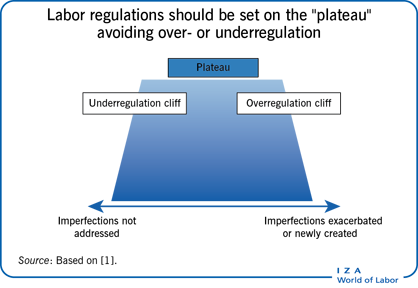Elevator pitch
Governments regulate employment to protect workers and improve labor market efficiency. But, regulations, such as minimum wages and job security rules, can be controversial. Thus, decisions on setting employment regulations should be based on empirical evidence of their likely impacts. Research suggests that most countries set regulations in the appropriate range. But this is not always the case and it can be costly when countries over- or underregulate their labor markets. In developing countries, effective regulation also depends on enforcement and education policies that will increase compliance.
Key findings
Pros
Labor market regulations can improve the employment situation of vulnerable workers.
Concerns about large negative effects on employment and productivity are not substantiated in most countries.
Negative effects can be minimized if regulations are consistent with good practices in the specific country context and if compliance and interactions with other regulations and institutions are considered.
Labor regulations can provide incentives for employers to implement productivity enhancing actions like training and technological and organizational innovation.
Careful empirical monitoring and evaluation can identify positive and negative effects of regulations and thus improve the design of labor market rules.
Cons
Overly stringent regulations can impede job creation and reduce formal employment, especially for youth and unskilled workers.
Underregulation does not address problems of worker protection, uneven bargaining power, and inadequate information.
Compliance can be a challenge for developing countries with large informal sectors and low administrative capacity.
Monitoring the effects of regulations can be difficult if labor market information is inadequate.
Decisions on labor market regulations are often dictated by political concerns rather than evidence.
